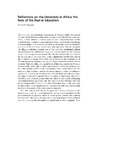| dc.contributor.author | Segobye, A.K. | |
| dc.date.accessioned | 2011-03-09T14:06:38Z | |
| dc.date.available | 2011-03-09T14:06:38Z | |
| dc.date.issued | 2007 | |
| dc.identifier.citation | Segobye, A.K. (2007) Reflections on the University in Africa: the role of the past in education, Social Dynamics, Vol. 33, No. 1, pp. 224-231 | en_US |
| dc.identifier.issn | 0253-3952 (print); 1940-7874 (online) | |
| dc.identifier.uri | http://hdl.handle.net/10311/741 | |
| dc.description.abstract | The colonial and postcolonial experiences of Africans reflect the myriad changes which African societies have undergone over the last few centuries.
These include cultural, political and economic transformations mainly carried through formal education and the entrenching of western knowledge
and technologies. The material and ideological changes were facilitated by
a number of factors which varied over time and place. Formal education
via religious missions became one of the tools for accelerated cultural
transformation. It instilled new values and cultural aspirations for Africans caught in the complexities of colonial life. Education became the main vehicle
for many forms of liberation from poverty, oppression and the inequities oflife. It offered an escape from what was perceived as the inadequacies of
African knowledge systems creating new classes and voices within African societies. University education, as and when it became accessible to Africans, was invariably laden with multiple expectations for those who gained entry from their families and the wider communities within which they lived. The
university thus became a complex landscape steeped in often contradictory
aspirations including the transformation of individual and collective ideas.
For some, it marked the attainment of a position of superiority, elite status, and often new forms of power, whilst for others it was a place of learning and enlightenment, associated with the creation of new liberties, and tools
for realising broader freedoms. The idea of transformation in the university
in Africa can thus be situated in the contradictions and opportunities that
university education in Africa has come to represent. | en_US |
| dc.language.iso | en | en_US |
| dc.publisher | Routledge (Taylor and Francis) www.routledge.com | en_US |
| dc.subject | Education | en_US |
| dc.subject | Reflections | en_US |
| dc.subject | Role | en_US |
| dc.subject | Africa | en_US |
| dc.subject | University | en_US |
| dc.title | Reflections on the University in Africa: the role of the past in education | en_US |
| dc.type | Published Article | en_US |
| dc.link | http://www.routledge.com/ | en_US |

